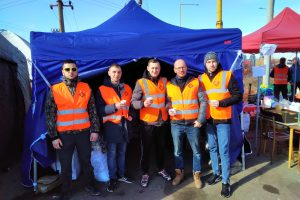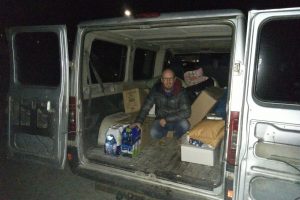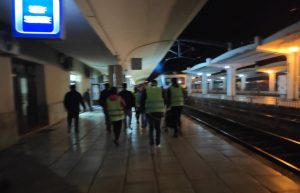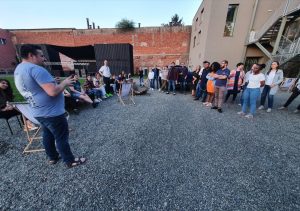Adapting to respond: Community philanthropy and the war in Ukraine
08 Jun 2023
In February 2022, the Russian invasion of Ukraine sparked a massive humanitarian crisis with devastating consequences for Ukraine itself, as well as the wider region. Local individuals and organizations were the first responders, driven by their deep personal understanding of the local context and most urgent needs. While international humanitarian aid has a tendency to overlook – even sometimes undermine – the roles of local responses and local resources in times of crisis, the war in Ukraine has once again shown that they are absolutely critical.
Almost a year to the day after the war began, in February 2023 the GFCF and National Network of Local Philanthropy Development organized an online conversation that looked back on some of the hardest and most inspiring aspects of community philanthropy’s response to the war in Ukraine. Specifically, the session explored how three organizations – in Slovakia, Romania and Ukraine – responded to the growing humanitarian crisis on their doorstep. Recordings are available in both English and Ukrainian.
During the first ten days of the Russian invasion of Ukraine, over 300,000 people fled across the border into Slovakia. The Carpathian Foundation, active in Slovakia since 1994, knew it had a role to play in responding to the crisis despite not being a humanitarian organization. From January 2022, when it had started to become clear that Russia would invade, the foundation had already started to consider its potential role. “The team had to consider how it would react if this happened and whether we were equipped to respond,” said Lara Dittel of the foundation. “We were absolutely clear that we had to help and respond really quickly.”
The foundation tapped into its crisis fund, which had a balance of €10,000, to launch a rapid grants scheme. It quickly began making small grants of up to €500 to NGOs, schools and local governments supporting the influx of people from Ukraine into the country. Understanding the value of responding rapidly and adjusting to changing needs, the foundation made grants every week and aimed to respond to groups seeking grants within two weeks of receiving the support request. Over the course of the year, the Carpathian Foundation supported 48 proposals with more than €170,000, having garnered further support from local and international funding partners.
The foundation also partnered with two local NGOs to deliver urgent humanitarian aid to Ukraine just four days after the war erupted. They focused on collecting in-kind donations, and acquiring urgent supplies such as medicine and medical equipment. In total, €200,000 worth of aid was transported by 54 minivans to communities across Western Ukraine. More than 100 volunteers were involved with packaging and transporting the goods, contributing over 15,000 hours to the effort.
Meanwhile in Romania, Teodora Borghoff of the Timişoara Community Foundation shared how her country was still reeling from the impacts of the COVID-19 pandemic when the war broke out. While the foundation identifies itself more as a mobilizer and connector of local resources and change-makers, the social capital and trust it had built up over time thrust it into a more active response role when people from Ukraine began to arrive in Timişoara. The foundation also had an emergency fund, with approximately €80,000 reserved for crises such as these. This was rapidly deployed to meet the growing needs of those arriving in their community, including purchasing and distributing critical supplies such as water, hot drinks and medicine.
“The Timişoara Community Foundation intentionally avoided using the word ‘refugee’ and instead replaced it with ‘the new Ukrainian community in town.’ This recognized these individuals as real people with their own stories, talents and assets to bring to the table.”
According to the UNHCR, in 2022, 1.9 million people from Ukraine fled to Romania to escape the war. When responding to this mass movement of people, the Timişoara Community Foundation intentionally avoided using the word “refugee” and instead replaced it with “the new Ukrainian community in town.” This recognized these individuals as real people with their own stories, talents and assets to bring to the table, not just faceless “victims of war.”
By September 2022, a tension between local civil society actors and some INGOs operating in Romania was growing. Many local actors were beginning to feel that international actors didn’t have a sound understanding of the real, evolving challenges on the ground. Some INGOs were nudging local organizations towards building temporary shelters, as well as advising on what cars to buy for humanitarian work. The foundation pushed back, emphasizing that building trust, listening and mobilizing local resources were at the core of their strategic response to the crisis. Responses would be informed and led by the community itself, rather than dictated by external actors.
In Ukraine, Liddia Savenko from the Boyarka Community Foundation added that the most immediate need in Boyarka – located just outside of Kyiv – was to secure medical supplies. The foundation immediately began mobilizing such supplies, and specifically aimed to help the most vulnerable in their community: the elderly, the injured and those who had been displaced. As 2022 progressed, and with winter only a few weeks away, Russia started to target the energy and power grids across Ukraine. The Boyarka Community Foundation responded by creating heating spots in different locations in their community. Despite the difficult moment they were in, the foundation also experimented with new strategies and approaches for helping their community. For the first time, the foundation launched a grants programme, and made emergency grants ranging from $200 to $600. With their first cycle of grantmaking, the foundation made small grants to 36 local groups, supporting a pop-up hairdresser for internally displaced people, a range of events promoting social cohesion and inclusion, as well as initiatives offering psycho-social support services.
“It’s critical to highlight the importance of local networks and resources, as well as to find new ways to identify, value, and support what already exists – rather than to simply assume that those in crisis have nothing to offer.”
The stories of these three organizations, in the midst of war, is one of adaptation, resilience and a powerful reminder of the often overlooked impact of local actors (including community philanthropy organizations) in times of crisis. They illustrate that local actors need the freedom to drive their own solutions to the challenges they understand better than anyone, especially in uncertain times. As INGOs and international donors continue to respond to ongoing humanitarian crises around the globe, it’s critical to highlight the importance of local networks and resources, as well as to find new ways to identify, value, and support what already exists – rather than to simply assume that those in crisis have nothing to offer.






